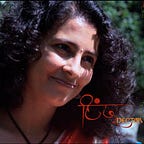Migrant Stories | Parbati Devi | Masalewali
< #Migrants: who are they? >
A few hours I spent with Parbati Devi from Ara, Bihar on the streets of #Delhi, eight years ago.
This may offer a glimpse into the #cultural richness and micro #enterprise of the people behind the faceless label and images we see of them these days.
—
< May 2012, Delhi >
On the roads of Old Dehli, she sells masalas.
She has to be spicy!
The afternoon sun is showering its glory on chandni chowk. I am walking, as advised, with my head covered in a sort of pagdi (turban), looking quite the outsider. On the road i notice a row of spices, decorated beautifully. I stop to take a few photos. From behind the camera, I hear a voice screaming — loud and strong — “Give me money. You can’t just take a photo without giving me money.”
I remove the camera to face the source directly. An angry woman is staring at me, gesturing for money. I kneel on the road, smile, and slowly tell her, “No. I won’t.” She is a little surprised to hear perfect hindi from a foreign looking person. Aggressive still, but a little toned down, she says, “ Why will you not?” My grin gets bigger, i wink and tell her, “Because you are beautiful…”
Smiles on the streets are infectious. She blushes, shrugs off the compliment and sings me a melody. “A song for a time … anytime when you are happy.”
Feeling naughty, I go a step ahead, “Arrae, what about some tea? I am at your shop. Won’t you offer me some tea?!”
Prompt is her response … out of the batuwa (purse) hanging around her neck, she takes out ten rupees and a boy is sent to fetch ‘special chai’, “लड़की हमारे यहॉ लक्षमी होती है, तुम्हे जो चाहिए बोलो, खाना खाअोगी?!” (A girl is a goddess for us, whatever you want, ask. Shall I get you some food?)
Parbati Devi comes from a culture where food is an expression of love, warmth, care and even worship. Her home is near Ara in Bihar. I’ve been there. I know. Rajju Bhaiyya in Ara subjected me to a lavish 10 course meal. And he sulked for over a day and half — when i refused to eat more than 3 chapatis, 2 pooris and half a plate of rice!
Parbati devi lives in Ghaziabad. Each day she catches a bus at 4 am to reach Chandni Chowk by 6 am. She sells masalas till 6 pm and then heads back. He husband works as a laborer in the village. They don’t own any land. Their sons have all migrated to the cities across India, searching for, “…better prospects.” In the monsoon season, when there is too much water on the chandni chowk roads, she goes back to the village. Its a rhythm she has been following for about a decade now.
As we wait for the ‘special chai’ i continue taking photographs. Much to Parbati’s discomfort, i catch her smiling in one. Like most women in India, she hates being photographed with the ‘teeth showing’. When i ask her, she laughs loudly and tells me, “The men shouldn’t know we have ‘teeth’! Its best to pamper their illusions as long as possible!”
Meanwhile, the slow paced conversation, the scorching sun, the gentle passage of time have made me a part of the footpath. The belt-wallah has offered me a drawer to sit on. He is in good business here. At the time of his marriage, he will ask for a tilak (dowry) of “…not less than 4 lacs. After all, i work in Delhi!” The kulfi wallah earns about 400–500 per day. The police wallah, from each of them, gets 300 Rs per day. Currency is flowing. Hard and fast. This way and that.
As the sun beings its homeward journey, chai arrives. Parbati, for my journey, has packed me a special chai masala. We have all had fun and the curiosity around me has faded. The ear cleaner offers to clean my ear. The kulfi wallah offers me a kulfi. Some young boys ask me how much i am selling the belts for. And the drunkard — unaware of his own boundaries — grabs my wrist. Before i can respond, Parbati jumps up, slaps him, and chases him away, abuses flowing freely. I am no longer a stranger now. Like her, I am just another woman on the streets … vulnerable and beautiful.
